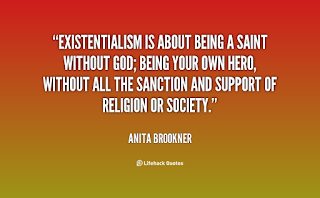Logan White
4/24/2016
Section 4
Philosophy
Dr. Oliver
POST I:
Existentialism
My first post is going to be based around the idea of
existentialism and the different philosophers that helped to contribute to the
idea. Existentialism is a philosophy that emphasizes the
originality and separation
of the individual experience in a hostile or unsympathetic universe; it regards human existence
as unexplainable, and emphasizes freedom of choice
and accountability for the consequences
of one's acts. Soren Kierkegaard is has
been credited as the first philosopher to deal with existentialism, although he
did not use that term. He theorized that each person should be held responsible
for giving meaning to his or her lives, without the persuading influences of
society and religion. Frederick Nietzsche was another famous philosopher
credited with being one of the first to take on the topic of existentialism. He
defined existentialism as basically just being able to do whatever you want.
Society has all of these rules that you are supposed to follow, but why can’t
we just do what we want to do and focus on ourselves? The topic itself presents
a very “do what you want” view.
While I do agree with certain aspects
of existentialism, I find it hard to agree with it in its entirety. I do think that it is important for everybody to find themselves apart from the influences of things such as society, because knowing who you are as a person makes going about life much easier. However, I do not agree that valuing things other than yourself, or having certain beliefs make you a lesser person. Also, to me the concept of existentialism seems kind of dangerous. The idea that you should separate yourself from society and religion and laws and having that "do what you want" attitude could lead to chaos.
On the other hand there is an alluring aspect to existentialism. I'm not saying that I would want to live as an existentialist, but it seems like a very "go with the flow" kind of life. We could also tie it back to our many discussions on "free will".
“I want to leave, to go somewhere where I should be really in my place, where I would fit in… but my place is nowhere; I am unwanted.”
“One is still what one is going to cease to be and already what one is going to become. One lives one’s death, one dies one’s life.”
“I know. I know that I shall never again meet anything or anybody who will inspire me with passion. You know, it’s quite a job starting to love somebody. You have to have energy, generosity, blindness. There is even a moment, in the very beginning, when you have to jump across a precipice: if you think about it you don’t do it. I know I’ll never jump again.”
All in all the topic of existentialism comes across to me as a negative way of looking at the world. There are so many different details that make up my life and who I am. Family, friends, religion and society are some of those things. I feel as if it would have been hard to find myself without them.


"[Nietzsche] defined existentialism as basically just being able to do whatever you want." - well, except (he says) a superior person always wants to do what's hard, not what's easy. An ubermensch will seek to overcome challenges and resistances, and not settle for utilitarian pleasure or comfort.
ReplyDeleteSartre "knew" a lot of things that might not be so, didn't he?
If you're interested in this topic, be sure to check out Sarah Bakewell's "At the Existentialist Cafe"...